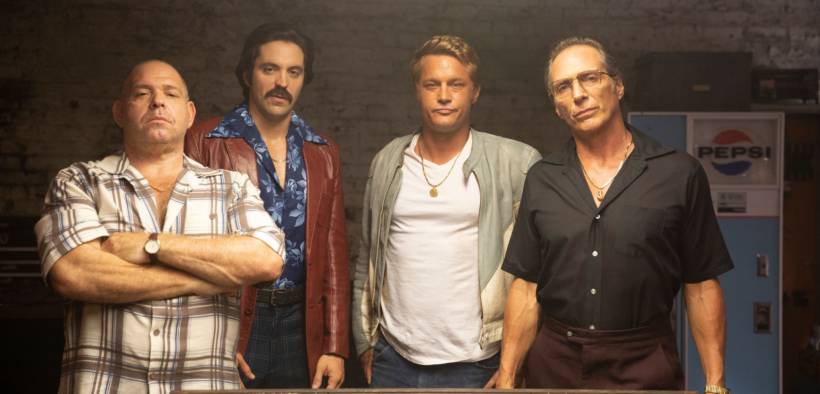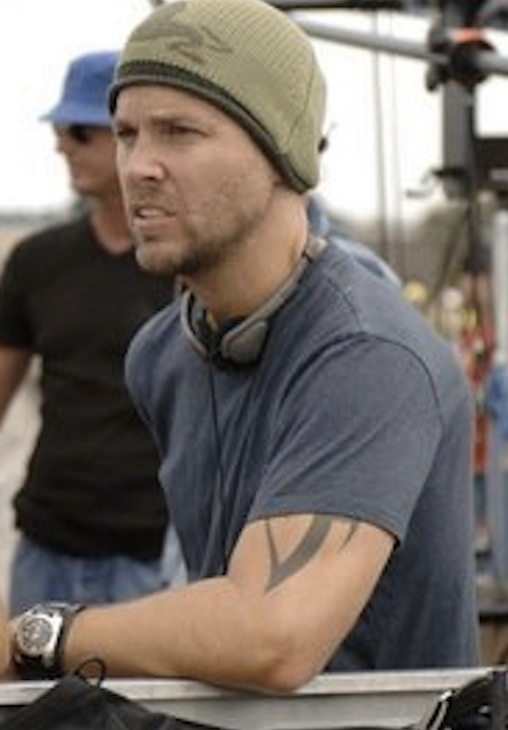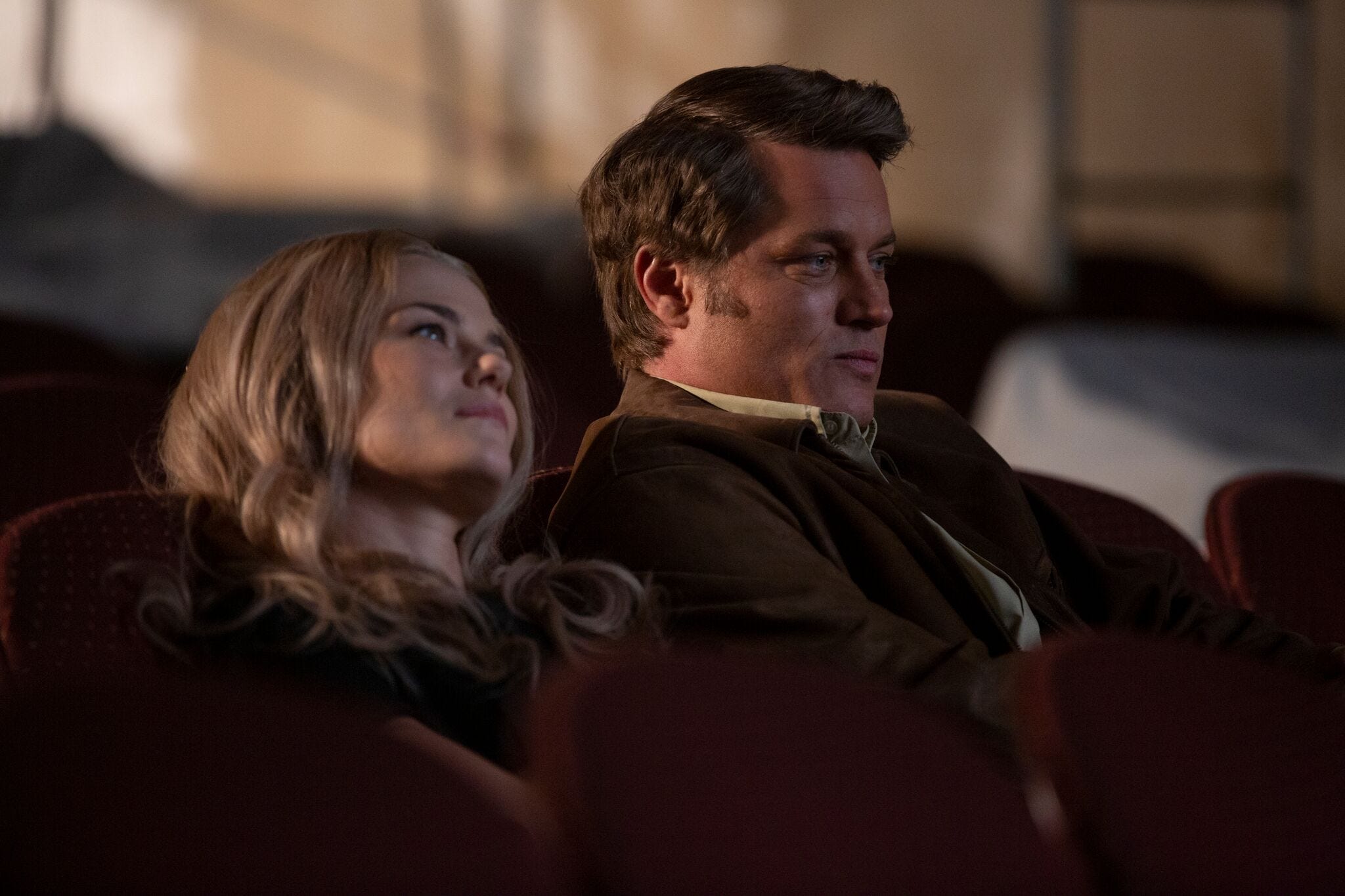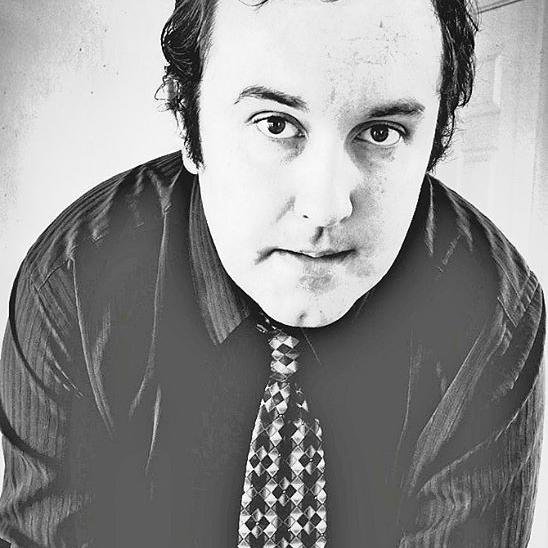Interview: Mark Steven Johnson on His True Heist Story of Richard Nixon’s Dirty Money

Grumpy Old Men, the heist film & a true story of Dick Nixon’s dirty money: meet director Mark Steven Johnson of Finding Steve McQueen.
Filmmaker Mark Steven Johnson dishes on filmmaking, screenwriting, Richard Nixon’s dirty campaign funds, the Grumpy Old Men musical and more as it relates to his newest film, the incredibly fun Finding Steve McQueen.
This interview originally appeared at The 405.
I caught up with writer/director Mark Steven Johnson (Simon Birch, Killng Season, Ghost Rider) for a chat on filmmaking, the heist movie, Grumpy Old Men (which he wrote) at 25 years, screenwriting, Trump and similarities to Richard Nixon, and more as it relates to his latest – a take on the heist film that is based on the true story of Richard Nixon’s dirty money and one of the largest bank heists of all time – Finding Steve McQueen.
Inspired by the true story of the biggest bank heist of all time that you’ve probably never heard of, Harry Barber (Travis Fimmel) recounts how in 1972 a gang of close-knit thieves from Youngstown, Ohio attempted to steal $30 Million in illegal campaign contributions from President Richard Nixon’s secret fund. But the plan quickly goes sideways, prompting the biggest manhunt in FBI history with more than 125 agents assigned to the case.
Finding Steve McQueen is a fun-as-hell ride that’ll keep you wanting more when it’s over, seemingly all too early. It is great entertainment – the reason we go to the movies in the first place, with a kickass ’70s soundtrack to boot. The film also stars Rachael Taylor, William Fichtner, Lily Rabe, Rhys Coiro, and Forest Whitaker. Check out screenwriter and reporter Keith Sharon‘s retelling of the story (on which the film is based) in his series “Stealing Nixon’s Millions” here.

Director Mark Steven Johnson. Photo courtesy of Mark Steven Johnson.
Catch Finding Steve McQueen On Digital and On Demand now from Momentum Pictures and enjoy the interview below.
Hello Mark, how are you?
Hey Wess, how you doing? I’m good, man, how you doing?
Oh, fighting a bit of a nasty chest cold, but what can you do this time of year? My apologies if I have to cough while we’re talking.
Of course, no worries. Oh shit, I hope you get better, I hope it’s on its way out and not coming in.
Oh me too, and thank you for that. Getting right into it, what was it that attracted you to Finding Steve McQueen as a project?
You know it was, the script was sent to me and I asked what it was about and they told me it was a heist film, and I said “pass,” just because I’d never had the idea to make a heist movie. And there’s just been so many great ones. You just can’t compete with it. You know, I have nothing new to say about it.
I understand that feeling although I think you did contribute in the way Finding Steve McQueen’s story is told.
And then my producer, Anthony Mastromauro said, “Just read it.” And I did. And I realized it wasn’t really a heist film, there was heist in it, but it really a love story. And that’s what I got excited about. You know, because the movie is told all out of sequence, it’s got like five different timelines going on, so it’s like a puzzle piece. And so you don’t watch the movie and think, you know, in most heist films, it’s all about the planning, the execution, and the aftermath of the heist. Are they gonna get away with it?
Indeed. Finding Steve McQueen had an excellent flow.
And this one opens up eight years after that. Which I thought was really cool. It was really interesting. It was like, if they get away with it, we’re told right away in the first minute: they got away with it. And you realize it’s really about a love story. Is she gonna forgive him when he tells her? When he confesses. Are they gonna go away together, even have to go to jail? And so it’s kind of interesting, you set up that kind of ticking time bomb in this diner and then we flashback and you keep jumping around in the story. But he comes back to the diner to track their love story. Their relationship throughout it. And that, I thought, was really cool.
And then, the second thing was that I’d never heard of it, I didn’t believe it was a true story, I kept Googling while I was reading it. You know?
Definitely.
That can’t be true, that can’t be true. And it was. All the most outrageous parts of the story are all factual and I thought, “How did I never hear about this?” And I realized most people never heard of this story. And that was exciting to me. You know, to tell the true story that no one’s ever heard of that’s such an outrageous concept. You know?
Absolutely.
So, that got me very excited. You know, there’s an interesting part, this is all I can think of. There’s a part in the movie where she says to him, “So you went off to rip off the President of the United States?,” and he said, “Yeah,” he thought it was a good idea at the time. And she says, “And you were gonna get away with it, how exactly?”
And Harry says, “Well, it’s dirty money, we figured that even if we get caught, there’s nothing they can do about it.” You know? And I think that’s why you never hear about it. Because Nixon had dirty campaign money in a bank in Laguna. The FBI wasn’t in on it, other than that there was a bank robbery, and they didn’t wanna let that out. And the bank robbers aren’t gonna talk about it cause they’re all on the run. So you can see why he kept this secret for so many years.
Great points. Nixon was almost on his way out with Watergate too as the robbery happened in 1972.
And then, Keith Sharon – whose one of our screenwriters – he wrote a series for the Orange County Register called “Stealing Nixon’s Millions”, documenting this true story, he did all the research. And that’s how it all started. By his research. And now he’s got a podcast, actually I’ve got it right now, it’s pretty fascinating.

Source: Larry Nista, OC Register
Nice. Being a true crime geek, I’ll absolutely check that out too. What were the challenges like for you on the film?
You know, honestly, I’d never made a movie this small before. That was the biggest challenge, in fact, the movie was a five and a half million dollar budget, which is small. And I’ve made movies with a hundred million dollar budget. And so, that’s just a whole, you kind of like feel like a film student again. You’re like, how can we get this shot? How can we, you know, how are we gonna, you have to rethink everything. Like, okay, we can’t afford a big, you know, car crash scene because we can only afford, you know, two GTOs, and one of them doesn’t work. We’re like, okay, if we crash this car, the movie’s over. You’re thinking that way.
Wow yeah. I imagine.
So, that’s difficult but it’s fun also because there’s a spirit to it, you know? There’s no fat anywhere, no one’s getting rich, no one’s getting paid, so people that are doing it are doing it because they love the script and they love the director and want to do something different. So, that really seeps into the energy of it, which I loved, you know?
That’s a great thing when that spirit is there. Sort of related on that energy idea, any funny or memorable moments that stick out in your mind from that filming process?
Oh, goodness, there’s so many. I think overall for me, it was probably just the energy of the guy, you know. Usually when you do a movie, and you work a long day, and you wrap an actor for the day, he goes home. And in this movie, it was one of those rare cases, where when you’d wrap somebody, they would stay. Nobody wanted to go home, ’cause it was fun.
Why would you want to go back to your hotel room? Why sit there and eat room service and go to bed, when you could sit here on set and make fun of everybody, and a lot happened. Some jokes. So, that kind of spirit is really wonderful. We’re also good friends, all the actors, and everybody’s on the group text called “The Idiots”. We text each other all the time. And maybe they’ll chime in from wherever they are in the world, check it on each other. And that’s something that makes it worth it, you know? When you have that kind of comradery and it shows on film, I think you can tell, the fun these guys had playing together, you know?

(L-R) Rachael Taylor as Molly Murphy and Travis Fimmel as Harry Barber in the Momentum Pictures’ action, crime, comedy “Finding Steve McQueen”. Photo courtesy of Momentum Pictures.
Oh, absolutely, I think it really did show in the film. And another thing I’m kind of curious about there. Sadly, those themes of that dark money and sort of, you know, that corruption that has proven to be eternal. You know, since Nixon. I’m just wondering, what do you hope people will take with them from the film?
Well, I think, you know, it was a fascinating time to make this movie, right? And now that it’s finally coming out, it’s even more so. I mean, every day you hear about Nixon and Watergate on the news. And it always kind of blows my mind that, someone mentioned 1972, after all this time, you turn on the news, CNN, and there’s Roger Stone doing the Nixon peace sign out on the steps. And he’s showing off his Nixon tattoo on his back. And you’re like, what is going on? I mean, we’re right back where we were. You know? And “I’m not a crook” has become “no collusion.” You know? The “witch hunt“.
History repeating.
And maybe, who knows? Maybe nothing will happen. Maybe not. But I tell my kids all the time, I know you’re tired of hearing all about what’s going on Trump right now, but you have to pay attention because this is a historic time in our country. And you get to witness it. So, watch it because this is an amazing time. And so I think it’s one of those where you’re making this period film that suddenly has become incredibly topical. So, it’s a fascinating time for this film to come out.
Oh, absolutely. Crazy times, Mark. Crazy times.
You know, I would be remiss if I didn’t ask while I had you, any reflections on Grumpy Old Men at 25 years?
Yeah, 25 years. You know, it’s a funny thing because I still dream about those guys. I have dreams about Walter [Matthau] and Jack [Lemmon]. They were a huge part of my life. And the fact that I broke into the business writing about home, writing about Minnesota where I’m from, and these characters, they’re always with me. And in fact, there’s actually, believe it or not, they’re putting together a Grumpy Old Men musical right now.
Oh, wow.
Which is actually terrific. Yeah, it got great reviews, they’re gonna be touring it this year. So, I think it’s gonna be in my head still. Which I’m very happy about, actually.
[Laughs] that’s great. Half of my family’s from Minnesota so it resonates with me too.
Oh, right on. Oh, great.
Yeah, Moorehead and Detroit Lakes.
Oh, there you go. Yeah, you could go to Wabasha now and, where the movie is set, the home of Grumpy Old Men. It’s so funny. So they do that, Grumpy Old Men Days every winter. You know, polar bear plunge and ice fishing contests, snowmobile races. I’ve been doing it for over 25 years, it’s really great.
That’s awesome. A question I like to ask everybody, what makes a great film?
A great film? Oh, boy.
It’s a big question, I know.
For me, it’s the one, sometimes it’s not even when you see it, sometimes, I’ll see a film and I’m not sure how I feel about it. And then I wake up the next day and I’m still thinking about it. And then, I watch it again. And then I watch it again. And then I watch it again. And then I realize, this is a great movie. Some movies, you know right away, but a lot of times, there’s a movie, I’m trying to think of an example for myself, you know, for example, would be Fight Club.
I remember the first time I saw Fight Club and I wasn’t sure what to think of it. It was so dark and it was so messed up and interesting, but I remember walking out thinking, I don’t know, man, I’m not sure how I feel about it. The next morning, I was still thinking about it. And I watched it again. And then I watched it again and watched it again… And I find that a lot, actually with Fincher’s movies. Sometimes they take time to process, you know?
They really do. I think a lot of them really resonate after they’ve marinated for a while, likely because of just how detailed they are (something Fincher is legendary for). The last question, what’s next for you?
You know, I’ve got two things I’m working on. One is a movie that I’m producing and I wrote called Lucy Boomer with Shirley MacLaine. And we’re trying to cast that right now for the summer. And then I have another movie, a comedy called Patrick 1.5, which is a really lovely film, and same thing – casting right now, so I can’t say too much, but they’re both front runner stuff, so I’m hoping that both could be going this summer.







